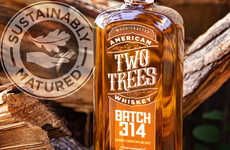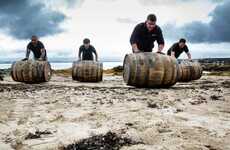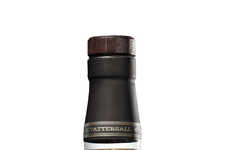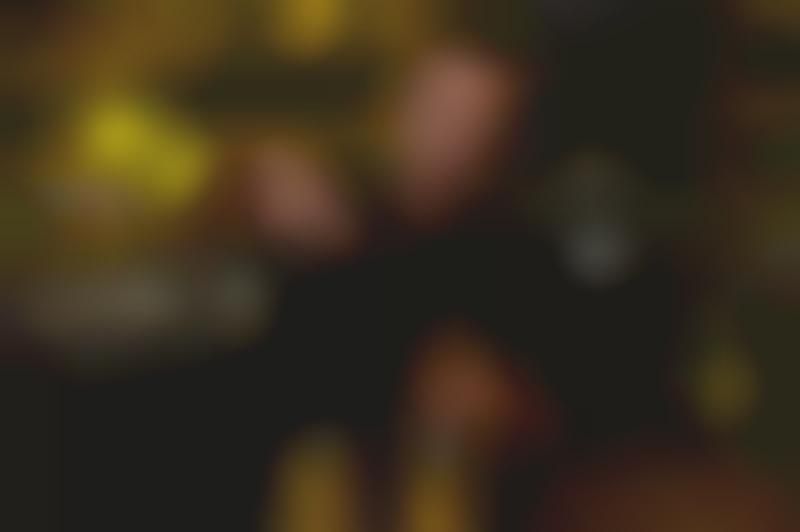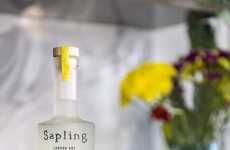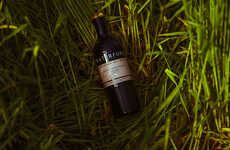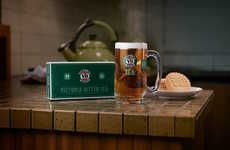
A Talk with Cam Formica, Co-Founder of Willibald Farm Distillery
References: instagram & drinkwillibald
Willibald Farm functions as a distillery, a restaurant, with plans to soon be a brewery as well. The brand focuses on a grain-to-glass spirit production at its distillery located on its farm in Ayr, Ontario, where all of the produces are made from raw ingredients. As the brand continues to grow, there is a strong focus of incorporating its own farm-grown ingredients to its spirit production. The restaurant embodies a true sense of 'farm-to-table' -- drawing ingredients grown on the farm, including farm-raised beef, beehives, herb gardens, and more.
We sat down with Cam Formica -- one of the three founders of Willibald Farm Distillery, to talk about the importance of long-term thinking, the brand's dedicated sustainable practices, and next steps for the brand and industry as a whole.
Can you tell us a little bit about Willibald Farm Distillery and what inspired you and the other co-founders to start it?
Willibald came about from a desire to start our own business and to be our own bosses. Within recent years, there has been a shift towards returning to quality craftsmanship and having a more hands-on approach to creating goods, and that really appealed to us. We asked ourselves, what do we enjoy, what are our passions? At the end of the day, we are passionate about quality goods, particularly whiskey and spirits. When we started going through the list, these were the things that stood out to us and presented themselves as the most exciting field to be in the long term. Especially when you start looking at the potential. We owned a large farm property already and because so much of today's production is done in industrial spaces and commercial spaces, the idea of reconnecting the agricultural roots of the industry to the products that we're making was really attractive.
Did the team face any challenges as a first-generation farm distillery in a small town?
Yeah, a lot. For one, touching back on the agricultural aspect, we're on a farm; A 100-acre farm and so the challenge is that the property was zoned as agriculture, not as industrial - which is really the only zoning that can handle distillation because you're essentially making fuel. So we had to go through quite a few planning hurdles to get to the point where the zoning could be altered or tweaked to accommodate the distillation process on the farm. It was about a year and a half just to get a building permit to start construction. Then it was about two years of construction, and then within that period, it was jumping through some more legislative hoops. Keep in mind, this is before we were even able to start recipe development, as you aren’t legally permitted to distill without licensing in Ontario, which requires the building and equipment to be in place. Also, when you’re a first-generation distiller, you don’t have anyone to lean on for recipe development support. It comes down to the willingness to research, test, and taste, on a continual basis.
Understandably, sustainability is very important to the brand with roots in an agricultural community. How does Willibald Farm Distillery practice sustainability through the different elements of the brand?
I think sustainability is based around the idea of long term thinking. The brand follows that in many ways. A lot of the grain we use right now is Ontario-sourced grain. We do this in order to help support our local economy and to encourage economic sustainability in the area. While we're buying this grain, we're simultaneously converting 60 farmable acres on our farm to have organic certification, with hopes of growing our own grain on-site one day. In addition to that, we cool our fermentation tanks with geothermal loops that have been run under our parking lot. All of our wastewater from distillation gets put onto the field as fertilizer, we've started to reincorporate some of the most traditional farming styles and we offset our energy usage with solar panels. We're slowly making the move toward complete environmental sustainability or as close to it as we can get.
We grass graze cattle as opposed to grain-feed, which ultimately maintains the pasture. Through this, we are able to harvest better quality beef, which ends up in our restaurant. We've also reincorporated beehives to the farm, which help to pollinate the farm, and it's been more lively than ever. So, I think there are a lot of little elements with the idea of just making sure that there is a business for us to manage tomorrow, not just worried about how much money we can make today, you know? For the case of most of the ‘farm-to-table’ restaurants that you may visit, you're in the city or you're in a town and they're drawing right from producers which is really cool, but it's different when you're at the farm. At Willibald Farm, you sit down and enjoy your meal and you're looking out seeing where your food comes from. This is something that we believe is very important and that as a society, we've moved farther and farther away from. Having a farm restaurant creates a lot of challenges but reconnecting people to their food source is to us, completely worth it.
What inspired you to launch the brewery and what can be expected from it?
The launch of the brewery... I wouldn't say it was planned from the beginning. Everything with the brand, I think kind of starts as a little bit of a half-joke. The distillery started like "Oh, that'd be cool to start a distillery", and then it was like "You know what would be really cool? If we just added a little restaurant to this." So the next thing you know, a year later, we have a restaurant open. The three of us all grew up in Ayr together, the town where the distillery and farm are, and another one of our good friends - independent of all of this - went off and learned how to brew beer. Joe has a robust brewing history, having brewed in L.A., London, Michigan and in Copenhagen. When he was in LA, he phoned us and was like "Hey, I'm thinking of coming home, do you guys want to start something?" Given that we had already left space in the distillery for expansion, this was a no-brainer. Beer also has agricultural origins, so to us, it really fits with our ethos and our vision. We also all really love beer. So I think it falls on passion again, and diving into what the brand is about and it is that we enjoy. We enjoy spirits, beer, great food and dining out, and I think that so far, the brand has done a really great job of being an amalgamation of all these.
With the dedication to sustainable practices in the scope, where do you think your industry will look like in 10 years?
As with any industry, the least sustainable businesses will either have to adapt or fall off. Especially with industries like brewing and distilling that rely intensely on water supply. They are very water intense industries, so I think the ones that are more sustainable-minded, especially with regards to the water supply, will be in good shape. I think really beyond that, it's going to be up to the customer to determine what they want in a product. We don't believe most consumers at this point are aware enough about the process in which their spirits or beer are made to really look at sustainability as a driving purchasing factor. Even with regards to the LCBO, it's hard to say whether or not people are purchasing from the 'organic' section with sustainability in mind. I think as consumers become more aware of how their products are produced, more conscious about how they're living, as well as the impact they have on the environment, sustainability will become increasingly top of mind. we really think that a lot of producers, especially those that are larger in scale, will make big shifts towards more sustainable production methods. With small producers, they may be forced to become a bit more agile and make smaller steps towards sustainable practices. That being said, this still remains to be seen given that it is still very early on in the game. I think the spirits business is a relatively stubborn one and until the consumer really starts to demand it, you may not see a meaningful shift. But we'll see. I think the next decade will be very exciting for our industry.
We sat down with Cam Formica -- one of the three founders of Willibald Farm Distillery, to talk about the importance of long-term thinking, the brand's dedicated sustainable practices, and next steps for the brand and industry as a whole.
Can you tell us a little bit about Willibald Farm Distillery and what inspired you and the other co-founders to start it?
Willibald came about from a desire to start our own business and to be our own bosses. Within recent years, there has been a shift towards returning to quality craftsmanship and having a more hands-on approach to creating goods, and that really appealed to us. We asked ourselves, what do we enjoy, what are our passions? At the end of the day, we are passionate about quality goods, particularly whiskey and spirits. When we started going through the list, these were the things that stood out to us and presented themselves as the most exciting field to be in the long term. Especially when you start looking at the potential. We owned a large farm property already and because so much of today's production is done in industrial spaces and commercial spaces, the idea of reconnecting the agricultural roots of the industry to the products that we're making was really attractive.
Did the team face any challenges as a first-generation farm distillery in a small town?
Yeah, a lot. For one, touching back on the agricultural aspect, we're on a farm; A 100-acre farm and so the challenge is that the property was zoned as agriculture, not as industrial - which is really the only zoning that can handle distillation because you're essentially making fuel. So we had to go through quite a few planning hurdles to get to the point where the zoning could be altered or tweaked to accommodate the distillation process on the farm. It was about a year and a half just to get a building permit to start construction. Then it was about two years of construction, and then within that period, it was jumping through some more legislative hoops. Keep in mind, this is before we were even able to start recipe development, as you aren’t legally permitted to distill without licensing in Ontario, which requires the building and equipment to be in place. Also, when you’re a first-generation distiller, you don’t have anyone to lean on for recipe development support. It comes down to the willingness to research, test, and taste, on a continual basis.
Understandably, sustainability is very important to the brand with roots in an agricultural community. How does Willibald Farm Distillery practice sustainability through the different elements of the brand?
I think sustainability is based around the idea of long term thinking. The brand follows that in many ways. A lot of the grain we use right now is Ontario-sourced grain. We do this in order to help support our local economy and to encourage economic sustainability in the area. While we're buying this grain, we're simultaneously converting 60 farmable acres on our farm to have organic certification, with hopes of growing our own grain on-site one day. In addition to that, we cool our fermentation tanks with geothermal loops that have been run under our parking lot. All of our wastewater from distillation gets put onto the field as fertilizer, we've started to reincorporate some of the most traditional farming styles and we offset our energy usage with solar panels. We're slowly making the move toward complete environmental sustainability or as close to it as we can get.
We grass graze cattle as opposed to grain-feed, which ultimately maintains the pasture. Through this, we are able to harvest better quality beef, which ends up in our restaurant. We've also reincorporated beehives to the farm, which help to pollinate the farm, and it's been more lively than ever. So, I think there are a lot of little elements with the idea of just making sure that there is a business for us to manage tomorrow, not just worried about how much money we can make today, you know? For the case of most of the ‘farm-to-table’ restaurants that you may visit, you're in the city or you're in a town and they're drawing right from producers which is really cool, but it's different when you're at the farm. At Willibald Farm, you sit down and enjoy your meal and you're looking out seeing where your food comes from. This is something that we believe is very important and that as a society, we've moved farther and farther away from. Having a farm restaurant creates a lot of challenges but reconnecting people to their food source is to us, completely worth it.
What inspired you to launch the brewery and what can be expected from it?
The launch of the brewery... I wouldn't say it was planned from the beginning. Everything with the brand, I think kind of starts as a little bit of a half-joke. The distillery started like "Oh, that'd be cool to start a distillery", and then it was like "You know what would be really cool? If we just added a little restaurant to this." So the next thing you know, a year later, we have a restaurant open. The three of us all grew up in Ayr together, the town where the distillery and farm are, and another one of our good friends - independent of all of this - went off and learned how to brew beer. Joe has a robust brewing history, having brewed in L.A., London, Michigan and in Copenhagen. When he was in LA, he phoned us and was like "Hey, I'm thinking of coming home, do you guys want to start something?" Given that we had already left space in the distillery for expansion, this was a no-brainer. Beer also has agricultural origins, so to us, it really fits with our ethos and our vision. We also all really love beer. So I think it falls on passion again, and diving into what the brand is about and it is that we enjoy. We enjoy spirits, beer, great food and dining out, and I think that so far, the brand has done a really great job of being an amalgamation of all these.
With the dedication to sustainable practices in the scope, where do you think your industry will look like in 10 years?
As with any industry, the least sustainable businesses will either have to adapt or fall off. Especially with industries like brewing and distilling that rely intensely on water supply. They are very water intense industries, so I think the ones that are more sustainable-minded, especially with regards to the water supply, will be in good shape. I think really beyond that, it's going to be up to the customer to determine what they want in a product. We don't believe most consumers at this point are aware enough about the process in which their spirits or beer are made to really look at sustainability as a driving purchasing factor. Even with regards to the LCBO, it's hard to say whether or not people are purchasing from the 'organic' section with sustainability in mind. I think as consumers become more aware of how their products are produced, more conscious about how they're living, as well as the impact they have on the environment, sustainability will become increasingly top of mind. we really think that a lot of producers, especially those that are larger in scale, will make big shifts towards more sustainable production methods. With small producers, they may be forced to become a bit more agile and make smaller steps towards sustainable practices. That being said, this still remains to be seen given that it is still very early on in the game. I think the spirits business is a relatively stubborn one and until the consumer really starts to demand it, you may not see a meaningful shift. But we'll see. I think the next decade will be very exciting for our industry.
Trend Themes
1. Grain-to-glass Spirit Production - Opportunity for distilleries to focus on producing spirits made from raw ingredients, emphasizing quality craftsmanship and the connection to agricultural roots.
2. Sustainable Farm-to-table Restaurants - Potential for restaurants to incorporate farm-grown ingredients and reconnect people to their food source, emphasizing environmental sustainability and high-quality dining experiences.
3. Shift Towards Sustainable Brewing - Potential for breweries to adopt sustainability practices, particularly in relation to water supply, and for consumers to prioritize sustainably produced beer as awareness of production processes and environmental impact grows.
Industry Implications
1. Distillery - Opportunity for distilleries to disrupt the spirits industry by prioritizing grain-to-glass production and incorporating sustainable practices.
2. Restaurant - Opportunity for farm-to-table restaurants to disrupt the dining industry by sourcing ingredients from their own farms, promoting sustainability, and offering a unique dining experience.
3. Brewery - Opportunity for breweries to disrupt the beer industry by embracing sustainability and producing beer with a focus on water conservation and responsible sourcing of ingredients.
3.6
Score
Popularity
Activity
Freshness


